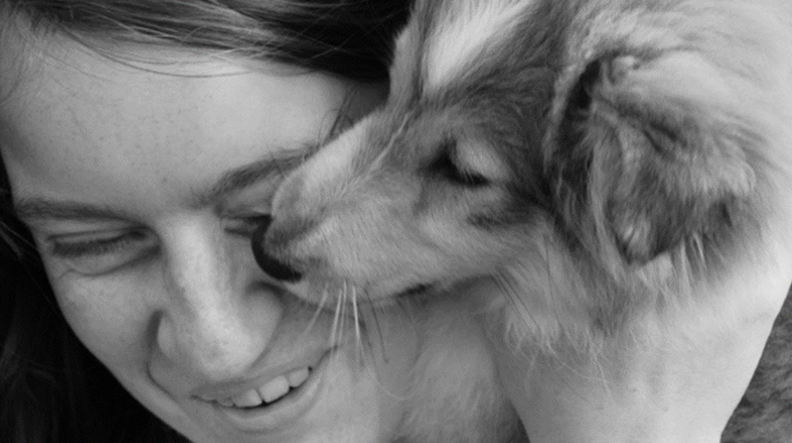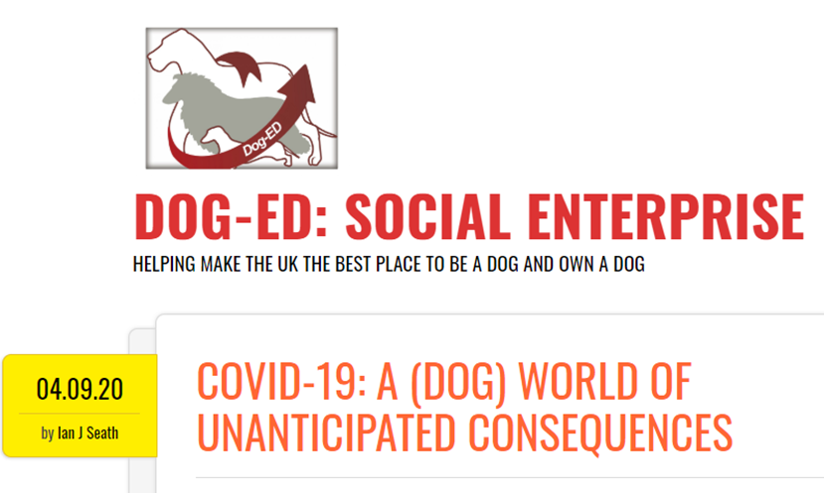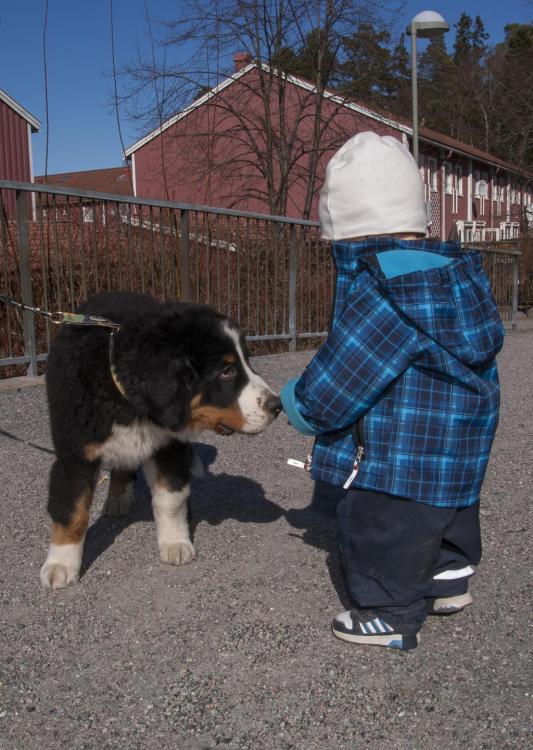
"DOGS ARE FOR LIFE, not just for Coronavirus."
The wonderful thing about our IPFD collaborator, brilliant person, and incredibly knowledgeable dog person Ian Seath, is that, when major issues are at foot, my procrastination at commenting is rewarded by him posting an article that says almost everything I wish I would have said. All that is left for me to do is to add a few comments and send it out.
This is very true for his latest installment on his platform Dog-Ed: COVID-19: A (dog) world of unanticipated consequences
Ian does a great job of describing our situation, with relation to other experience of times of disruption: "In the world of business and leadership development, there’s a concept that’s been around for a while that describes the world we’re in. It’s VUCA, which stands for Volatile, Uncertain, Complex and Ambiguous. ...There are no simple solutions in a VUCA world; we need to understand that decisions made in one part of a system can have quite surprising and unanticipated consequences elsewhere. Often, those consequences will be counter-intuitive."
He goes on to describe different possible outcomes and ramifications for dog registrations in the UK - a situation IPFD is monitoring together with our many KC Partners from different countries. As Ian suggests, things could go either way. In Iceland, after the financial collapse in 2008, breeders were worried they would not find homes for their puppies; in fact, demand was higher as people realized they would not be able to travel outside the country as much and embraced the new reality and options. It is clear that there is an uptick in adoptions in North America (and UK as described in Ian's article). And while we totally agree that pets are fantastic companions, we have to think about 'unintended consequences'.
Where did your Covid-dog come from? And what happens when life goes back to normal?
Ian does an excellent job describing concerns about sourcing of puppies, supply and demand, rescues, and more. In every case it is, at least potentially, a 'for better and for worse situation'. Firstly, being able to determine the quality and welfare of dogs from various sources of dogs is an ongoing challenge, possibly increased during the Covid situation when people are in a rush to get a pet. For example, some sources, especially with online sales, even if promoted as 'rescues', may be re-sourcing puppy-farmed dogs. Beyond that concern - in North America there is a generally positive response to news that shelters and rescues are emptying out... which is great as long as there is not a flood back to shelters when economic hardships hit if restrictions continue, or if, when people return to work, they suddenly remember why they did not really have the capacity to be responsible dog owners. And I saw a report that dogs adoptions were not allowed now in France, for various reasons, no doubt - and that approach may both prevent some and create other problems. Beyond immediate and short terms concerns, animal welfare problems are an ongoing concern throughout the world and may be more marked as we move out of the current crisis and into the new normal. One example - given economics and financial expenditures for the pandemic, many (most?) non-profits will be challenged in the near future with reduced funds and donations. And, will animal welfare programs suffer with the focus on the problems of people? We must work to be sure that does not happen. And, as has been discussed in other blogs,
Ian does a great job describing possible impacts on the dogs, themselves. I would add that online training courses are great, but without the opportunity for e.g. puppy classes, dogs might not get the socialization with others of their own kind. One of our IPFD consultants is concerned about similar issues with her 19-month-old toddler - surrounded by adults but deprived of play opportunities with other children. (We feel he may be fine however, as his best friend is their Corgi, who is likely an excellent surrogate for other kids!) Then, as Ian suggests, perhaps being overly-socialized (my term) with people - receiving 24/7 attention now - what happens when that suddenly stops?
Ian's main point is unintended consequences - and I might add that in times of stress, urgency, and uncertainty there is likely an increased tendency for impulsive vs. well-considered decisions - about many things, including breeding or acquiring a dog. At IPFD, everything we do reminds us of the inter-connectedness of issues of health and welfare, the role of human-dog interactions, and the roles and contributions of many stakeholders. And everything we do, DogWellNet.com, International Dog Health Workshops, my blogs, etc. tries to remind us of the big picture.
As Ian suggests, models are great - but! As an epidemiologist, I have been asked about this frequently lately. And this is the reality: Models are only as good as the data and assumptions on which they are founded. Even with great inputs models inherently output predictions not certainties which should be expressed as such, with ranges ('error' in statistical terms) and as best-case/ worst-case scenarios, never exact proclamations. In the case of the novel (i.e. new to us) coronavirus there are vast unknowns, and therefore the uncertainties for models and decision making are huge.
Ian ends with: "There are unanticipated consequences of any decision, but my glass is always half-full and I am optimistic that we will come out of this situation stronger as a dog community. Remember: DOGS ARE FOR LIFE, not just for Coronavirus." And that last bit I started with as the title of this blog. Another blog is scheduled to cover the impacts in the veterinary world... including the constantly and quickly evolving world of veterinary regulations in the face of COVID-19, including the expanded possibilities or 'telemedicine'.
Let' follow Ian's lead, and try to think about the glass being half-full, look for creative ways to remain positive, and move forward with compassion for all.
After note: Since posting this blog, another article has come to my attention. "I Got a Pandemic Puppy, and You Can Too" in The Atlantic. This article is full of wonderful reasons why a dog is a great support and benefit to humans. And does caution, "as long as new owners act intentionally and with long-term planning in mind, the prolonged stretch of time at home might provide a unique chance for owners to bond with new pets." My concern is whether most people, in the rush to satisfy their short term needs, have really planned explicitly for those long term challenges or just think they can figure all that out down the road. And heaven forbid we start a trend where having a 'Pandemic Puppy' becomes a status thing. The authors go on to say, "This difficult period may mean that people become more attached and attuned to their pets than if they were seeing their animals for only a few hours a day, which may help get them through the hurdles of pet ownership with slightly less frustration." Indeed, and yet presumably people will transition rather easily to going back to work and adjust to less time with their dog. As mentioned it the blog above and the other we have cited... how easy will it be for the dog? Remember - that bond goes both ways. Will we have shelters getting inundated with 'Pandemic Puppies' with separation anxiety when their owners return to their busy lives? More unintended consequences? Also pertinent to the discussion above, and with absolutely no reference to specific sources mentioned to the article in The Atlantic, if a retail source can markedly and quickly increase the number of puppies available in response to Covid demand - I would want to carefully determine from where those animals came.
Glass half full again - let's hope we end up with more committed, responsible dog owners and well-adjusted healthy dogs in good situations. Let's hope.
.




Recommended Comments